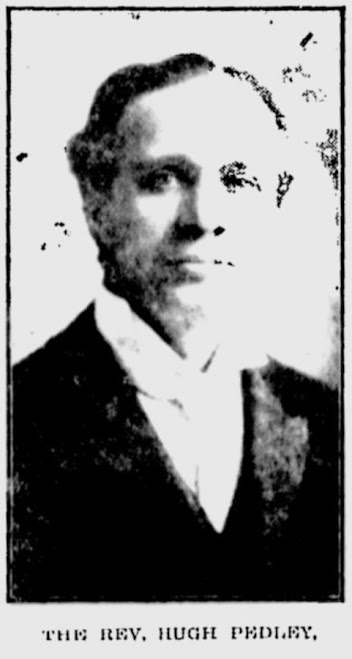 |
The Daily Witness, 16 May 1913
|
Looking Forward features cub reporter Billy Scooper. We also meet a disreputable promoter named Humphrey Hustleman. There aren't really any laughs, but there is fun to be had.
A 1913 novel set in 1927, Looking Forward reminded me of nothing so much as Tim Ososko's 1979 book Wasn't Tomorrow Wonderful?
Oh, boy, was it!
I gobbled up every detail of Rev Pedley's future Canada no matter how small, as in this description of a Montreal streetcar:
This carriage of the common
people was not without its touch of the beautiful. Instead of the long row of heterogeneous advertisements above the windows was a series of fine reproductions of great masters. The city authorities had
evidently decided that a ride in a street-car might
be a phase of the aesthetic education of the people.
They had come to the conclusion that, the suggestion
of beauty was better for the health of the people than
the suggestion of disease as furnished by the advertisements of patent medicines.
Montreal plays a central role in Looking Forward. It is the city in which Fergus attends university, it is the city in which he befriends those of different faiths, it is the city in which he meets and falls in love with Florence Atherton, it is the city in which he solves the mysteries of hibernation, and it is the city in which he marries Florence Atherton's daughter.
Its best not to focus on that last bit.
Some of Rev Pedley's predictions, like the Mount Royal Tunnel, would've been safe bets. Work began in 1911, two years before Looking Forward was published.
 |
| Construction of the Mount Royal Tunnel, c.1912. |
He also anticipates the amalgamation Port Arthur and Fort William, a done deal by 1927, which in reality did not take place until 1970. Rev Pedley's unified city is called Portchester, not Thunder Bay.
Most remarkably, this 1913 novel describes "magnificent new government buildings, which a devastating fire had rendered necessary." It was not three years after publication that the seat of Canadian government went up in flames.
 |
| The Globe, 4 February 1916 |
Telephones, automobiles, paved streets, aeroplanes, and dirigibles, the author plays it safe with his predictions. The outlier is a mountain built in the heart of Winnipeg by wealthy bachelor Irish-Canadian Teddy Ryan. I get the feeling that its existence is meant to be a joke.
Being a student of the Great War, and noting that this novel dates from 1913, I looked for recognition that Armageddon might be in the offing. I found it when Billy Scooper tells Fergus that news of his quarter-century hibernation has broken in the eastern papers. “Is it likely to make a stir?” our hero asks:
“Stir! Stir!” said the man excitedly. “Stir! The biggest ship on the sea might go down with all on board, the navies of Britain and France might have a battle with those of the Triple Alliance, Teddy Ryan’s mountain might turn into a volcano, and there wouldn’t be a bigger stir than there’s going to be over this.”
Reference to the Triple Alliance sent a bit of a chill.
Looking Forward was published the year before the start of the Great War. On 30 May 1915, when the conflict was in full force, Rev Pedley preached a sermon titled 'War and the New Earth,' in which he said these words:
Forget not, O forget not, that which is perhaps the noblest sacrifice of all, the surrender by parents of their sons, by wives of their husbands, to the hardships and deadly perils of war by land and self.
Hugh Pedley and his wife Eliza (née Field) had three sons. The eldest, Norman Field Pedley (1884-1909), a civil engineer, died when he was struck by a train in Springfield, Illinois.
 |
| Old McGill, 1906 |
Once war was declared, youngest son, Frank Gordon Pedley (1892-1972), enlisted and served ten months before returning to McGill to continue his medical studies.
 |
| Old McGill, 1913 |
Born in 1888, middle brother Hugh Stowell Pedley, a lawyer, served twenty-nine months. He was killed on 31 January 1918. His body rests at Villers-au-Bois, Departement du Pas-de-Calais, Nord-Pas-de-Calais, France.
 |
| Old McGill, 1912 |
Both men Frank and Hugh were recipients of the Military Cross.
Their father died on 26 July 1923, not two years before the realization of the union of of Canada's Presbyterian, Methodist, and Congregationalist churches.
 |
| The Gazette, 27 July 1923 |
The United Church of Canada celebrates its centenary today.
Would that Rev Pedley had lived to see it. Would that son Hugh had lived nearly so long.
Reprise: In the epilogue, the reader is presented with this passage which takes place in a future 1927 on the lookout of the steel structure lookout atop Mount Royal:
A couple of German merchants who are in Canada with a view to trade extension stop for a moment, and one says to the other: “Ach Gott! gegen diese zu fechten ware eine schande” (Good heavens! To fight with such as these would be a shame.)
Related post:
































